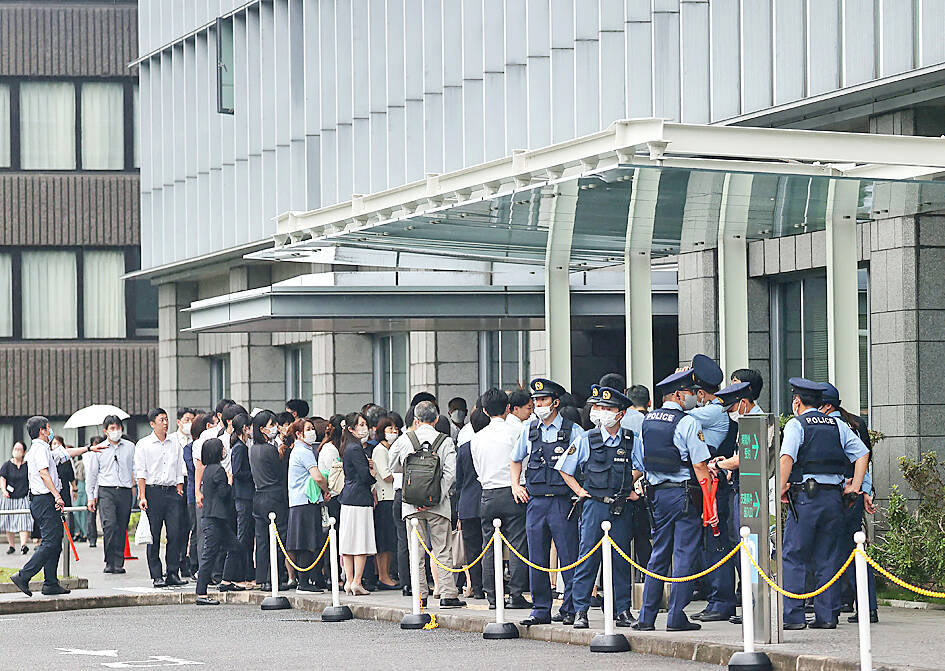A suspicious package that prompted the cancelation of a hearing for the man accused of murdering former Japanese prime minister Shinzo Abe contained only a petition, and no explosives, local media reported yesterday.
Tetsuya Yamagami had been due to make his first appearance before a court in Nara, Japan, on Monday, accused of shooting the former prime minister in July last year, but the session was “canceled as staff were evacuated from the building after a suspicious item was delivered to the court,” a court spokesman said.
Police were called after the object set off a metal detector, police said.

Photo: AFP
It was then moved to an open area, where bomb specialists in protective gear investigated.
“But no explosives or hazardous substances were found,” a police spokesman said, without giving further details.
Public broadcaster NHK said the box contained a printout of a Change.org petition seeking a lenient sentence for Yamagami.
The petition has amassed 13,000 signatures since last year and its organizer admitted to NHK that they had sent the document to the court.
“I sent the signatures in the hope that they would be seen by as many interested parties as possible,” the broadcaster quoted the person as saying, without identifying them. “As they were thick and it was raining, I put them in cardboard boxes... There was never any intention to obstruct justice.”
The sender contacted the police themselves after learning that the box had triggered a security alert, Kyodo news agency reported.
The court and police declined to confirm the reports.
Yamagami, 42, faces charges of murder and contravention of arms control laws, and could face the death penalty if convicted.
He reportedly targeted Abe — Japan’s best-known politician and longest-serving prime minister — over his ties to the Unification Church, the global sect whose members are sometimes referred to as “Moonies.”
The suspect is believed to have resented the church over large donations his mother made that bankrupted his family.
Details of his upbringing have stoked anger in Japan against the Unification Church and garnered Yamagami sympathy, with supporters sending him donations and signing the petition calling for leniency.

FRUSTRATIONS: One in seven youths in China and Indonesia are unemployed, and many in the region are stuck in low-productivity jobs, the World Bank said Young people across Asia are struggling to find good jobs, with many stuck in low-productivity work that the World Bank said could strain social stability as frustrations fuel a global wave of youth-led protests. The bank highlighted a persistent gap between younger and more experienced workers across several Asian economies in a regional economic update released yesterday, noting that one in seven young people in China and Indonesia are unemployed. The share of people now vulnerable to falling into poverty is now larger than the middle class in most countries, it said. “The employment rate is generally high, but the young struggle to

ENERGY SHIFT: A report by Ember suggests it is possible for the world to wean off polluting sources of power, such as coal and gas, even as demand for electricity surges Worldwide solar and wind power generation has outpaced electricity demand this year, and for the first time on record, renewable energies combined generated more power than coal, a new analysis said. Global solar generation grew by a record 31 percent in the first half of the year, while wind generation grew 7.7 percent, according to the report by the energy think tank Ember, which was released after midnight yesterday. Solar and wind generation combined grew by more than 400 terawatt hours, which was more than the increase in overall global demand during the same period, it said. The findings suggest it is

STEPPING UP: Diminished US polar science presence mean opportunities for the UK and other countries, although China or Russia might also fill that gap, a researcher said The UK’s flagship polar research vessel is to head to Antarctica next week to help advance dozens of climate change-linked science projects, as Western nations spearhead studies there while the US withdraws. The RRS Sir David Attenborough, a state-of-the-art ship named after the renowned British naturalist, would aid research on everything from “hunting underwater tsunamis” to tracking glacier melt and whale populations. Operated by the British Antarctic Survey (BAS), the country’s polar research institute, the 15,000-tonne icebreaker — boasting a helipad, and various laboratories and gadgetry — is pivotal to the UK’s efforts to assess climate change’s impact there. “The saying goes

TICKING CLOCK: A path to a budget agreement was still possible, the president’s office said, as a debate on reversing an increase of the pension age carries on French President Emmanuel Macron yesterday was racing to find a new prime minister within a two-day deadline after the resignation of outgoing French Prime Minister Sebastien Lecornu tipped the country deeper into political crisis. The presidency late on Wednesday said that Macron would name a new prime minister within 48 hours, indicating that the appointment would come by this evening at the latest. Lecornu told French television in an interview that he expected a new prime minister to be named — rather than early legislative elections or Macron’s resignation — to resolve the crisis. The developments were the latest twists in three tumultuous